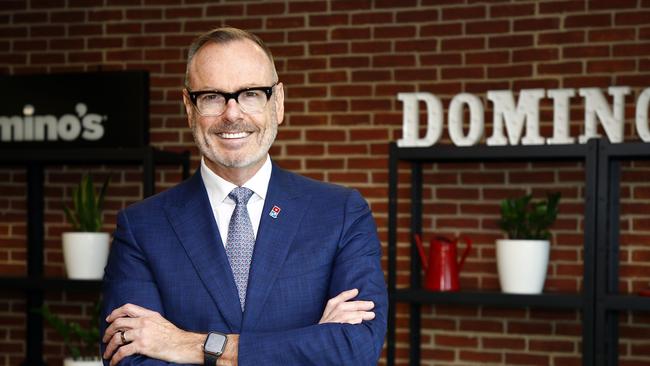New Domino’s boss Mark van Dyck has a full plate: analysts
The new boss of Domino’s Pizza has a number of challenges, including improving franchisee profitability and lifting struggling sales in its key Japan and Germany markets.

The retirement of Domino’s Pizza boss Don Meij after 22 years as chief executive and a trading update that provided mixed sales performance across its key markets has analysts keen to hear more from the new CEO.
On Tuesday Mr Meij, who started at the pizza maker as a delivery boy, announced his intentions to step down and be replaced by Mark van Dyck, an executive with the Compass Group, one of the world’s leading providers of food services with a market capitalisation of $US79bn and operations across 33 countries.
Domino’s also issued a trading update, ahead of its annual general meeting on Thursday, to reveal sales growth that was below market expectations and mixed results across its key geographies.
The update revealed group sales growth for the first 17 weeks of fiscal 2025 were down 1.2 per cent, against up 2.7 per cent for the same period last year, with Australia positively compounding last year’s strong sales but sales in Germany negative as well as in France and Japan.
For analysts, the departure of Mr Meij, who floated the company on the ASX almost 20 years ago, means the exit of a large personality within the business especially in terms of relationships with franchisees.
“Overall, whilst the market had been disappointed with the performance of Domino’s, Mr Meij was a key figure for the franchisees,” said E&P retail analyst Phillip Kimber.
“In one sense, Domino’s is in the business of selling franchises (that sell pizza) – thus franchisee relationships (including profitability) are crucial to the success of the business.
Whilst the incoming CEO has strong credentials from the Compass Group, managing the relationship with franchisees and improving their profitability will be his key challenge.”
In a note to clients, Macquarie said the trading update highlighted disappointing sales with limited recovery in underperforming geographies and struggling profitability for franchisees.
“France and Japan remain a drag on the business, with these areas highlighted as an area of weakness in the trading update (discussed below). Following a period of high inflation and now elevated interest rates, average franchisee profitability had deteriorated from $130,000 in 2021 to $95,000.
“Management had previously flagged ambitions to return store profitability to fiscal 2021 levels.”
Citi analyst Sam Teeger said there are three key issues that need to be resolved by the new CEO.
“Improving franchisee profitability which is needed for the rollout to resume and to justify the PE multiple, improving execution in key offshore growth markets – Japan, France and Germany – which represent 49 per cent of stores and 65 per cent of the longer-term rollout and the company rediscovering its competitive moat, which may have been eaten away by the growth in aggregators over the years.”




To join the conversation, please log in. Don't have an account? Register
Join the conversation, you are commenting as Logout